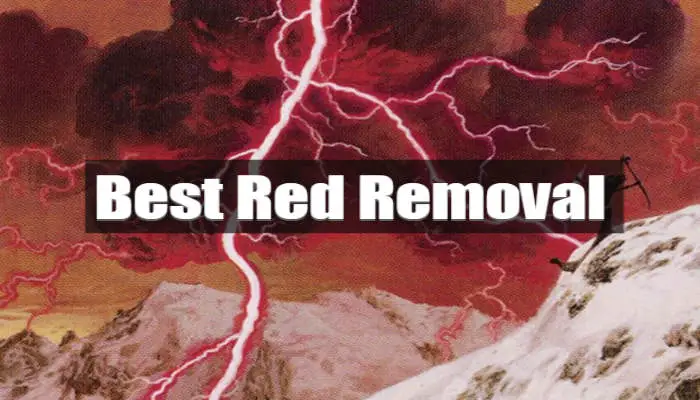Slowing opponents down and dealing with their significant threats is a must if you’re going to win games of magic. It’s such an intrinsic part of the game that every color has its own way of approaching removal. Today, I’ll discuss the best red removal spells in Magic: The Gathering.
Red is not a subtle color – Instead, it usually goes about things in a reckless, “act now, think later” fashion, which is reflected in red removal spells. They typically deal damage instead of destroying creatures outright. Many embrace an element of chaos as well and replace removed permanents with other cards at random. Red also can remove artifacts with ease.
Overall, it’s one of the best colors for removal. That said, let’s move on to the best red removal you can play, what makes it good, the pros & cons of each spell, and what formats I recommend you play them in.
Top 10 Red Removal Spells
Preface: Red also has many great
10. Comet Storm
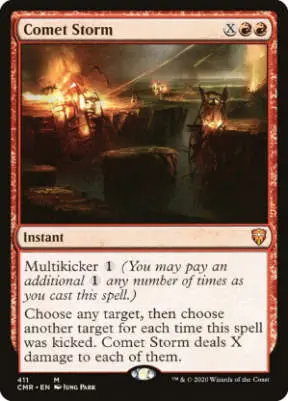
Ok, technically, this could be a
That said, each mana you pay into the kicker cost allows you to also deal that damage to another creature. So, if you cast this for five mana (x being three), you’d deal three damage to one target. But if you paid one more mana into it for the kicker cost, you’re now dealing three damage to three creatures.
| Pros | Cons |
| Instant speed | Expensive to cast |
| Versatile casting cost | |
| Can target multiple creatures |
Recommended Formats: Commander, Oathbreaker
9. Mizzium Mortars
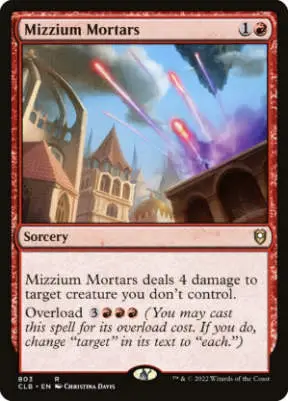
Like the previous entry, this can be a
If you choose to cast this for the alternative cost, you’ll replace all instances of “target” with “each.” So, now the card reads Mizzium Mortars deal four damage to each creature you don’t control. Not only does this give you a nice reset button when needed, but it’s also one-sided, which is backbreaking.
| Pros | Cons |
| Versatile – Spot removal and | Sorcery speed |
| One-sided | |
| Spot removal portion is efficient |
Recommended Formats: Pioneer, Commander, Oathbreaker
8. Kazuul’s Fury
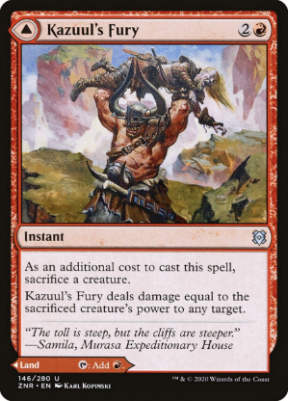
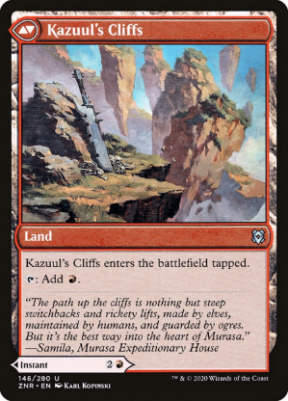
I’ve written about the best removal in white, blue, black, and green, and the MDFC that have removal on one side and land on the other have been on every list. Why? Because land and removal are some of the most important things to have access to in your deck. These give you both on a single card, and this versatility makes them phenomenal in most decks that can play them.
In the case of Kazuul’s Fury, the removal side, you’ll have to sacrifice a creature as you cast it to deal damage equal to its power to any target. Given the number of sacrifice strategies in colors like Rakdos (Red/Black), having a way to sac something usually isn’t a huge downside. However, sometimes you don’t have a creature with enough power to bring down a given target.
| Pros | Cons |
| Instant speed | You have to sacrifice a creature |
| Can deal very high damange | |
| Versatile – Offers removal or land | |
| Can damage any target |
Recommended Formats:
7. Wild Magic Surge
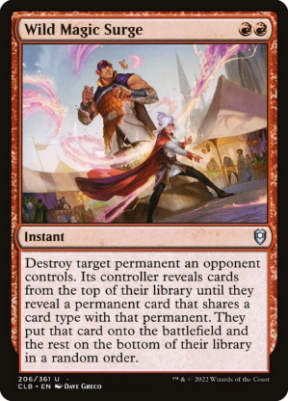
Wild Magic Surge is very similar to another popular red removal spell, Chaos Warp, which we’ll talk about later. Many of the good things found on Warp are also present here – It’s cheap to cast and capable of removing every permanent type. Where things start to differ is what happens once you’ve removed a permanent.
With both cards, your opponent will get to replace what you took with something somewhat random from their deck. However, in the case of Wild Magic Surge, the replacement isn’t as random because it’s guaranteed to share a type with the permanent you destroyed.
So, for example, if you remove a creature, your opponent is guaranteed to get another creature. If you remove an artifact, they’ll get to replace it with another artifact. The initial removal is just as good, but they’ll likely get a decent replacement a higher percentage of the time. This also uses the word “destroy,” so it won’t get around indestructible creatures.
| Pros | Cons |
| Instant speed | Opponent gets another card |
| Cheap to cast | The new card will share a card type with what you removed |
| Can remove any permanent type |
Recommended Formats: Commander, Oathbreaker
6. Fury
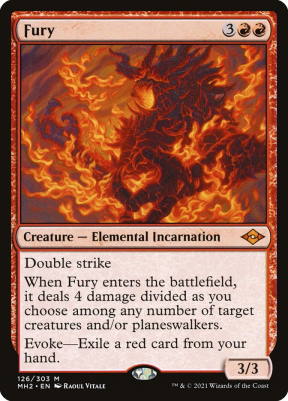
Fury and the other cards in the same cycle are all running rampant in formats like Modern. A combination of things contributes to them being so good. First, in the case of Fury, you get some great remove and a formidable threat as well. When this enters the battlefield, you get three damage to distribute among any number of creatures or Planeswalkers. And you’ll have a 3/3 creature with double strike.
The next central point is that this can be cast without any mana. I won’t say free because you have to exile a red card, but in-game, it feels like free. Granted, when someone throws this down for no mana, they must also sac it. However, getting four mana that can be split between multiple permanents and permanent types for zero mana swings a lot of games.
| Pros | Cons |
| Removal and a creature | You have to have a red card to cast it for free |
| Can be cast for zero mana | If you don’t evoke it, you have to pay full price |
| Can damage multiple permanents | |
| Hits creatures and planeswalkers |
Recommended Formats: Modern, Legacy, Vintage, Commander, Oathbreaker
5. Unholy Heat
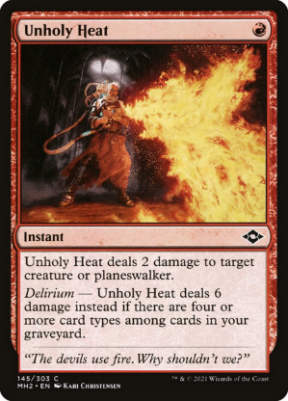
Unholy Heat was printed directly into Modern and immediately started making an impact there. As well as in some other eternal formats as well. It starts out dealing two damage to any creature or planeswalker. Given that it damages multiple permanent types, this already is decent overall and relatively versatile.
Where the card becomes a powerhouse is delirium, which makes this deal six damage instead of two so long as you have four or more card types in your graveyard. Yep, once the delirium cost is met, you triple the damage this can do. And getting four different card types into your graveyard is very easy for many decks.
For example, take the Murktide Regent deck popular in Modern that uses Unholy Heat well. With fetch lands like Scalding Tarn, free spells like Mishra’s Bauble, and one mana plays like Consider, you can have 75% of the card types you need as early as turn one.
Related: Archetype Overview – Modern Murktide Deck Tech
| Pros | Cons |
| Instant speed | Needs to have multiple card types in the graveyard to work well |
| Cheap to cast | |
| Hits creatures and planeswalkers | |
| Can easily deal six damage instead of two |
Recommended Formats: Modern, Legacy, Pauper
4. Red Elemental Blast / Pyroblast
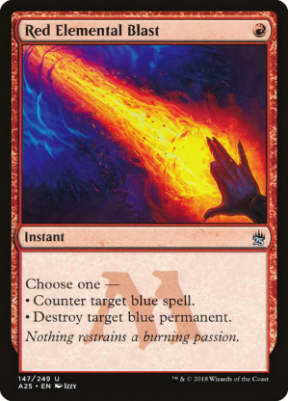
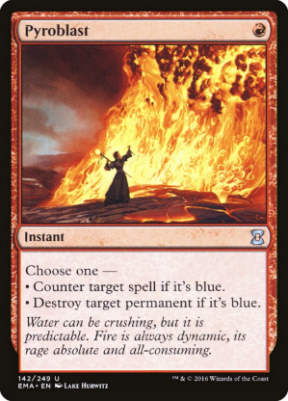
At number four, we have two functionally identical cards – Red Elemental Blast and Pyroblast. Both cards cost only a single mana and have the same two options. You can counter target blue spell or destroy target blue permant. This is absolutely incredible, as long as your opponent is playing blue. The card will be completely dead when they aren’t, and that’s the catch.
Related: Best Blue Removal Spells In Magic: The Gathering
Against blue? Unrivaled in efficiency and effectiveness. Against anything else? Nearly always not playable at all. So, if these are legal in your format, and there’s blue in your meta, you’ll not find better removal. You’ll want something else if you’re unsure what you are up against or if people don’t play blue.
| Pros | Cons |
| Instant speed | Only works against blue cards |
| Extremely efficient mana cost | |
| Removes any permanent type (As long as its blue) | |
| Is a counterspell and removal |
Recommended Formats: Legacy, Vintage, Pauper, Commander, Oathbreaker
3. Abrade
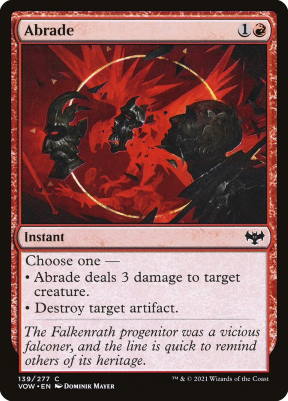
Abrade almost always makes it onto lists like this, but it’s usually a little lower. However, I think that’s a mistake, and it belongs pretty high. I mean, what’s not to like? You get a solid three damage to throw at a creature or the ability to destroy an artifact. Access to removal for both important permanent types makes the card highly versatile in many matchups.
Aside from the general playability, it’s highly efficient as well. These choices come together on a single card for only two mana and it’s instant speed. So, I ask again, what’s not to like? If you’re in red and don’t already use this, do yourself a favor and try it.
| Pros | Cons |
| Instant speed | Can’t remove larger creatures or target players |
| Cheap to cast | |
| Removes creatures and artifacts |
Recommended Formats: Standard, Pioneer, Modern, Pauper, Vintage, Legacy, commander, Oathbreaker
2. Chaos Warp
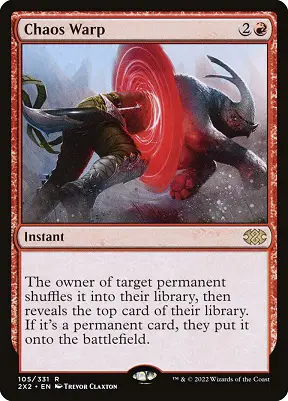
Perhaps the only major downside of red removal is that considering it’s usually damage-based, it struggles to bring down enormous threats. Chaos Warp doesn’t have that problem. Not only can it remove the biggest of creatures, but it’s also capable of dealing with every type of permanent for only three mana.
However, it wouldn’t be appropriately named “Chaos Warp” without a catch to shake things up. When you target something, and its controller shuffles it away, they get to put the top card of their library directly onto the battlefield. So, there’s no telling what will replace the card you targeted.
Of course, the idea here is that if you aim this at something substantial, the card they put into play will likely be less scary. In my experience, this is, indeed, usually the case. Even on the off-chance it does backfire, it’s hard to argue against a removal spell that hits literally anything in play.
| Pros | Cons |
| Instant speed | Opponent gets a replacement card |
| Can remove every permanent type | |
| Extremely versitile | |
| Efficient mana cost for permanent removal |
Recommended Formats: Commander, Oathbreaker
1. Lightning Bolt
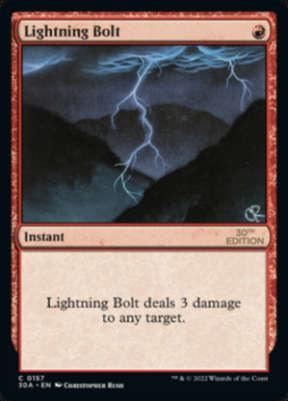
If you’re in red and looking for removal, it doesn’t get much better than Lightning Bolt. For a single mana, you get three damage to throw at whatever you want. At one CMC, three damage is a fantastic rate, and any creature with three or less toughness can be removed with this. Furthermore, you can target Planeswalkers or even players with the damage.
The fact that you can point this right at opposing players is a massive upside and gives the spell so much play. Bolt is never a dead card in any matchup because it always represents a three-damage burn spell, even if your opponent has nothing on
| Pros | Cons |
| Very cheap to cast | None |
| Great damage to cost ratio | |
| Instant speed | |
| Can damage any target |
Recommended Formats: Modern, Legacy, Vintage, Pauper, Commander, Oathbreaker
End Step
There you have it, my friends, the top red removal in Magic: The Gathering. Regardless of your format or strategy, you’ll find solid answers in red. I hope you have come away from this article with some new interaction for your next deck or tools to decide between two old favorites. Until next time, get out there are play some MTG.
